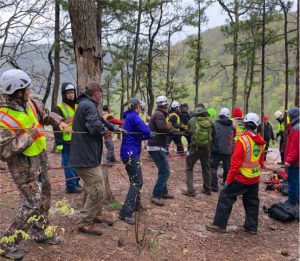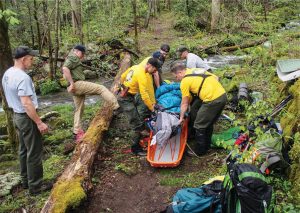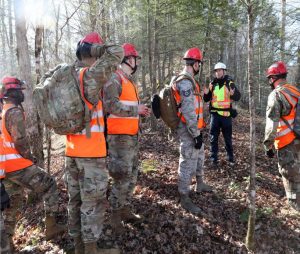 Wilderness Search and Rescue (SAR) is a demanding discipline that requires specialized strategies and faces unique challenges. This comprehensive article delves into the critical role of SAR teams in wilderness settings, exploring their strategies, techniques, and the complexities of responding to incidents in remote and rugged environments. From planning and communication to the physical and psychological challenges, this article provides a thorough examination of the dynamic field of wilderness SAR.
Wilderness Search and Rescue (SAR) is a demanding discipline that requires specialized strategies and faces unique challenges. This comprehensive article delves into the critical role of SAR teams in wilderness settings, exploring their strategies, techniques, and the complexities of responding to incidents in remote and rugged environments. From planning and communication to the physical and psychological challenges, this article provides a thorough examination of the dynamic field of wilderness SAR.
Wilderness SAR represents a critical lifeline for individuals lost or injured in the great outdoors. This article aims to provide an extensive exploration of the field of wilderness Search and Rescue, with a focus on the strategies and challenges it entails. We delve into the critical importance of timely and effective response in remote and rugged environments and how wilderness SAR teams work diligently to save lives and bring individuals to safety.
Wilderness SAR is marked by the diversity and unpredictability of the natural environment. This section explores the unique challenges presented by wilderness settings, from dense forests and high mountains to vast deserts and expansive bodies of water. Understanding the specific characteristics of these environments is vital for SAR success.
Planning and Preparedness
Effective wilderness SAR begins with meticulous planning and preparedness. This paragraph delves into the strategies and protocols that SAR teams employ to prepare for wilderness missions. It discusses pre-mission risk assessments, the establishment of command posts, and the importance of liaising with other agencies and organizations.
Search Strategies and Techniques
 Searching in the wilderness requires unique strategies and techniques. In this section, we explore the various search methods, including grid searches, line searches, and canine teams. We also discuss the role of technology, such as GIS and GPS, in enhancing search precision.
Searching in the wilderness requires unique strategies and techniques. In this section, we explore the various search methods, including grid searches, line searches, and canine teams. We also discuss the role of technology, such as GIS and GPS, in enhancing search precision.
SAR operations are led and executed by highly trained individuals. This paragraph delves into the significance of the human element in wilderness SAR, highlighting the specialized skills and physical endurance required. It also touches on the psychological challenges that SAR professionals often face.
Communication and Coordination
 Effective communication and coordination are vital in wilderness SAR. This section explores the complexities of communication in remote areas, the use of radio systems, and the establishment of incident command systems. The article underscores how clear and efficient communication enhances the overall effectiveness of
Effective communication and coordination are vital in wilderness SAR. This section explores the complexities of communication in remote areas, the use of radio systems, and the establishment of incident command systems. The article underscores how clear and efficient communication enhances the overall effectiveness of
SAR operations.
Risk Assessment and Safety
Safety is a paramount concern in wilderness SAR. This paragraph examines the risk assessments and safety protocols that SAR teams adhere to, including the management of hazards like inclement weather, wildlife encounters, and rugged terrain. It also discusses the importance of self-rescue and the protection of SAR personnel.
Challenges of Extended Missions
Wilderness SAR often involves prolonged missions. In this section, we delve into the challenges posed by extended operations, such as maintaining the well-being of both rescuers and victims, resource management, and the need for adaptability in dynamic environments.
Community Engagement and Education
 Engaging and educating the public about wilderness safety is a proactive approach to reducing the need for SAR. This paragraph explores the role of community engagement and education in preventing incidents and promoting responsible outdoor activities.
Engaging and educating the public about wilderness safety is a proactive approach to reducing the need for SAR. This paragraph explores the role of community engagement and education in preventing incidents and promoting responsible outdoor activities.
Wilderness Search and Rescue is an intricate and demanding discipline. This article has offered an extensive exploration of the strategies, techniques, and challenges that characterize the field. The dedication and unwavering commitment of wilderness SAR teams are evident as they work tirelessly to bring individuals home safely from remote and challenging environments. As the world’s wilderness areas continue to be explored and enjoyed, the importance of wilderness SAR remains undiminished, ensuring that help is never too far away when adventure turns into a struggle for survival.




















































